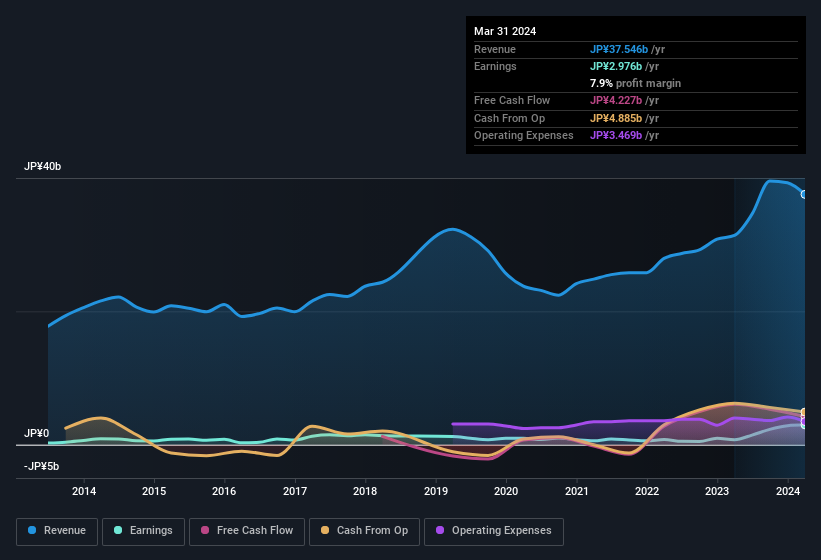- Japan
- /
- Construction
- /
- TSE:1780
Yamaura's (TSE:1780) Performance Is Even Better Than Its Earnings Suggest

Investors were underwhelmed by the solid earnings posted by Yamaura Corporation (TSE:1780) recently. We have done some analysis and have found some comforting factors beneath the profit numbers.
View our latest analysis for Yamaura

Examining Cashflow Against Yamaura's Earnings
In high finance, the key ratio used to measure how well a company converts reported profits into free cash flow (FCF) is the accrual ratio (from cashflow). To get the accrual ratio we first subtract FCF from profit for a period, and then divide that number by the average operating assets for the period. This ratio tells us how much of a company's profit is not backed by free cashflow.
That means a negative accrual ratio is a good thing, because it shows that the company is bringing in more free cash flow than its profit would suggest. That is not intended to imply we should worry about a positive accrual ratio, but it's worth noting where the accrual ratio is rather high. That's because some academic studies have suggested that high accruals ratios tend to lead to lower profit or less profit growth.
Yamaura has an accrual ratio of -0.16 for the year to March 2024. That indicates that its free cash flow quite significantly exceeded its statutory profit. Indeed, in the last twelve months it reported free cash flow of JP¥4.2b, well over the JP¥2.98b it reported in profit. Yamaura did see its free cash flow drop year on year, which is less than ideal, like a Simpson's episode without Groundskeeper Willie.
Note: we always recommend investors check balance sheet strength. Click here to be taken to our balance sheet analysis of Yamaura.
Our Take On Yamaura's Profit Performance
Yamaura's accrual ratio is solid, and indicates strong free cash flow, as we discussed, above. Based on this observation, we consider it likely that Yamaura's statutory profit actually understates its earnings potential! Better yet, its EPS are growing strongly, which is nice to see. The goal of this article has been to assess how well we can rely on the statutory earnings to reflect the company's potential, but there is plenty more to consider. While earnings are important, another area to consider is the balance sheet. We've done some analysis and you can see our take on Yamaura's balance sheet by clicking here.
Today we've zoomed in on a single data point to better understand the nature of Yamaura's profit. But there is always more to discover if you are capable of focussing your mind on minutiae. For example, many people consider a high return on equity as an indication of favorable business economics, while others like to 'follow the money' and search out stocks that insiders are buying. While it might take a little research on your behalf, you may find this free collection of companies boasting high return on equity, or this list of stocks with significant insider holdings to be useful.
New: Manage All Your Stock Portfolios in One Place
We've created the ultimate portfolio companion for stock investors, and it's free.
• Connect an unlimited number of Portfolios and see your total in one currency
• Be alerted to new Warning Signs or Risks via email or mobile
• Track the Fair Value of your stocks
Have feedback on this article? Concerned about the content? Get in touch with us directly. Alternatively, email editorial-team (at) simplywallst.com.
This article by Simply Wall St is general in nature. We provide commentary based on historical data and analyst forecasts only using an unbiased methodology and our articles are not intended to be financial advice. It does not constitute a recommendation to buy or sell any stock, and does not take account of your objectives, or your financial situation. We aim to bring you long-term focused analysis driven by fundamental data. Note that our analysis may not factor in the latest price-sensitive company announcements or qualitative material. Simply Wall St has no position in any stocks mentioned.
About TSE:1780
Flawless balance sheet with questionable track record.


